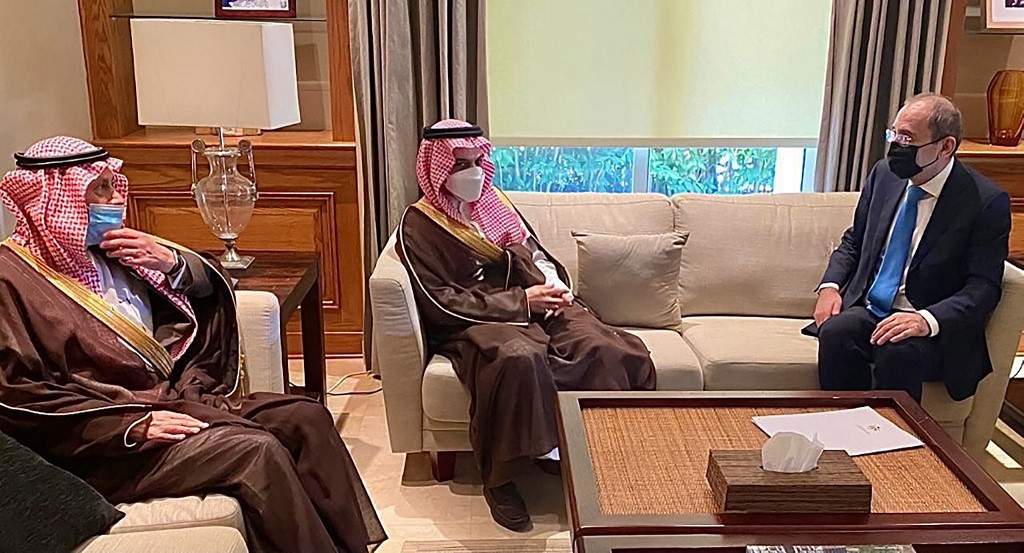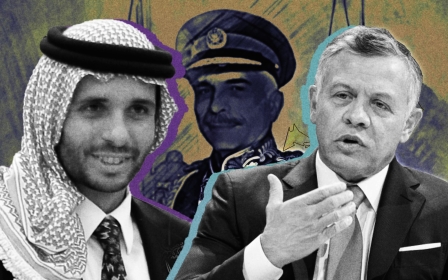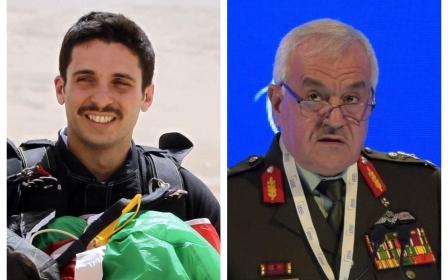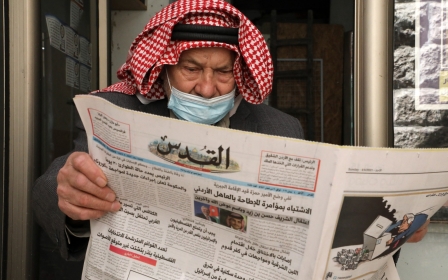Jordan: Saudi minister flies to Amman with 'message of support' after crackdown

Saudi Minister of Foreign Affairs Faisal bin Farhan met on Tuesday with his Jordanian counterpart, Ayman al-Safadi, in Amman, in the wake of a series of arrests in the Hashemite kingdom over suspicions of an alleged coup plot.
The Saudi Ministry of Foreign Affairs tweeted that bin Farhan arrived in the Hashemite kingdom on Monday with a message of support from Riyadh's King Salman to Jordan’s King Abdullah II.
Bassem Awadallah, a Jordanian-Saudi citizen, is among those whose arrest was announced on Saturday over allegedly "undermining the security" of Jordan.
The Washington Post reported that Saudi Arabia has sought to convince Jordan to release Awadallah, who served as economic secretary to the Jordanian premier from 1992 to 1996 and was appointed head of Jordan's royal court in 2007, before being sacked from the position less than a year later.
Awadallah is reported to have spent the last few years working as a consultant for Saudi Crown Prince Mohammed bin Salman, with some news outlets calling him one of the masterminds of the privatisation of Saudi Arabia's energy giant Aramco.
Awadallah, 56, appeared alongside bin Salman at the annual Future Investment Initiative (FII) held in Riyadh in January.
Quoting a senior Middle Eastern intelligence official with inside knowledge, the Washington Post reported that Riyadh was seeking to bring Awadallah to Saudi Arabia.
“The Saudis were saying that they won’t leave the country without him,” the official told The Washington Post. “It would appear that they are worried about what he would say.”
Saudi Ministry of Foreign Affairs denied on Tuesday that it had requested Awadallah's release.
An official told CNN that bin Farhan was in Jordan “to confirm the solidarity and support of the Saudi Arabia kingdom with the Jordanian kingdom… The minister did not discuss any other issues or made any requests.”
Jordan's Foreign Ministry has yet to respond to requests for comment on The Washington Post report.
The ministry released a statement on Tuesday saying that the security of both kingdoms "is united and both are standing together in the faces of all challenges".
Jordan placed a gag order on national media on Tuesday, barring them from publishing news on the incidents of Saturday after Prince Hamzah bin Hussein signed a letter expressing loyalty to King Abdullah, his half-brother.
The former crown prince had previously issued recordings claiming he was under de facto house arrest over his contacts with disaffected tribal leaders and others in Jordan deeemed critical of the king.
On Monday, King Abdullah and Prince Hamzah reportedly agreed to mediate a rift within the royal family in a sign of easing tensions.
Besides Awadallah, at least 15 others accused of "undermining the security" of Jordan have been arrested in a large-scale campaign, including royal family member Sharif Hassan bin Zaid, Prince Hamzah's office director Yasser al-Majali, and Adnan Abu Hammad, who manages Hamzah's palace.
Awadallah was one of several figures whom Jordanians called to be tried for corruption during protests that erupted in the country in 2011, 2012 and in 2018.
Following his dismissal from Jordan’s royal court, Awadallah moved to Dubai and established a company, Tomouh, and has reportedly been living between the United Arab Emirates and Saudi Arabia.
According to the records of Companies House in the UK, Awadallah has extensive partnerships with Saudi businessmen in the Arab National Bank (ANB) and heads the bank's London branch, along with a number of Saudi partners.
He is also known for maintaining a network of prominent business connections, including through his presence on the board of directors of Al Baraka Banking Group in Bahrain.
Middle East Eye delivers independent and unrivalled coverage and analysis of the Middle East, North Africa and beyond. To learn more about republishing this content and the associated fees, please fill out this form. More about MEE can be found here.




